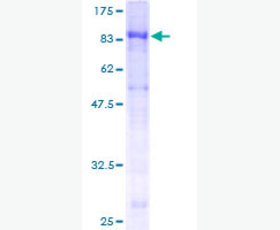Recombinant Mouse Carbonic Ahydrase 14/CA14
| Product name: | Recombinant Mouse Carbonic Ahydrase 14/CA14 |
| Source: | E.coli |
| Purity: | Greater than 95% as determined by reducing SDS-PAGE. |
| Buffer Formulation: | Supplied as a 0.2 μm filtered solution of 20mM Tris,150mM NaCl,pH8.0. |
| Applications: | Applications:SDS-PAGE; WB; ELISA; IP. |
| Storage: | Avoid repeated freeze/thaw cycles. Store at 2-8 oC for one month. Aliquot and store at -80 oC for 12 months. |
| UOM: | 100ug/50ug/200ug/1mg/1g |
| Source | E.coli |
| Description | Recombinant Mouse Carbonic anhydrase 14 is produced by our E.coli expression system and the target gene encoding Ala16-Met290 is expressed with a 6His tag at the N-terminus. |
| Names | Carbonic Anhydrase 14, Carbonate Dehydratase XIV, Carbonic Anhydrase XIV, CA-XIV, CA14, |
| Accession # | Q9WVT6 |
| Formulation | Supplied as a 0.2 μm filtered solution of 20mM Tris,150mM NaCl,pH8.0. |
| Shipping |
The product is shipped on dry ice/ice packs. |
| Storage |
Store at < -20°C, stable for 6 months after receipt. Please minimize freeze-thaw cycles. |
| Purity |
Greater than 95% as determined by reducing SDS-PAGE. |
| Endotoxin | Less than 0.1 ng/µg (1 IEU/µg) as determined by LAL test. |
| Amino Acid Sequence |
MNHKVHHHHHHMADGGHHWTYEGPHGQDHWPTSYPECGGDAQSPINIQTDSVIFDPDLPAVQPHG YDQLGTEPLDLHNNGHTVQLSLPPTLHLGGLPRKYTAAQLHLHWGQRGSLEGSEHQINSEATAAE LHVVHYDSQSYSSLSEAAQKPQGLAVLGILIEVGETENPAYDHILSRLHEIRYKDQKTSVPPFSV RELFPQQLEQFFRYNGSLTTPPCYQSVLWTVFNRRAQISMGQLEKLQETLSSTEEDPSEPLVQNY RVPQPLNQRTIFASFIQAGPLYTTGEM
|
| Background | Mouse Ca14,also known as Carbonic anhydrase 14,is a member of large family of zinc metalloenzymes .It could catalyze reversible hydration of carbon dioxide. The reaction is fundamental to many processes such as respiration, renal tubular acidification and bone resorption. Fifteen CA isoforms have been reported so far. They have different patterns of tissue-specific expression and physiologic roles. Some CAs may serve as markers for tumors and hypoxia. CA XIV is a polypeptide consisting of an extracellular N-terminal catalytic domain, a membrane-spanning segment and a short intracellular C- terminal segment with several potential phosphorylation sites. A subset of CAs lack CA activity due to point mutations but retain esterase function. CA14 is widely expressed in the central nervous system |














